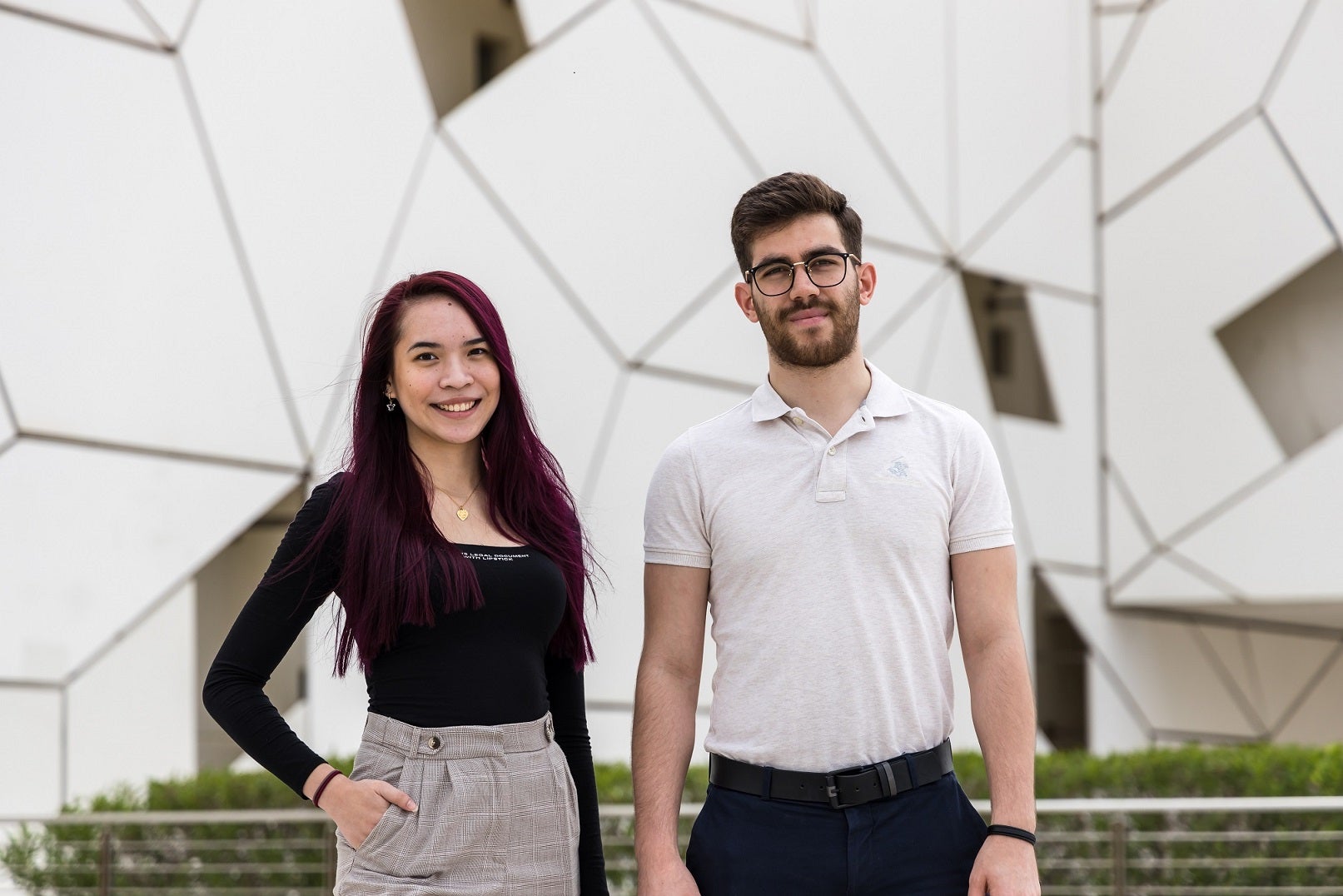
Johanne Medina and Mohamed Amara constitute part of HBKU’s youngest learning cohorts, yet both have larger-than-life dreams. The students, who are enrolled in the College of Science and Engineering’s Bachelor of Computer Engineering program, have prudently aligned their ambition with that of an upcoming legacy -- Qatar’s hosting of the World Cup 2022.
Less than a year ago, Medina and Amara -- both enterprising goal-seekers -- set out to create a tourism-supporting platform, one that is unique and adaptable to the Qatari market. The application, which they dubbed QataGo, utilizes machine learning and smart web scraping technologies to curate and create individual profiles, guiding users through the intricacies of Qatar’s burgeoning tourism sector. Registered users can benefit from a truly customized yet exhilarating experience across the nation’s hotel, food, and entertainment industries.
“The hope is for this to be a well-timed initiative as Qatar approaches 2022 and prepares to welcome an influx of tourists,” said Amara, who anticipates anywhere between 2.9 to 3.6 million international tourists in 2022 (almost equivalent to Qatar’s current population).
QataGo’s unique business proposition lies in the fact that no other application has been able to aggregate and integrate various industries into one country-specific platform. The application leverages Qatar’s already existing touristic appeal, with the country ranked eighth in the world by the World Tourism Organization and one of the ‘most open’ countries of the Middle East.
On a SWOT analysis grid, QataGo’s strength points are clearly in the application’s highly personalized yet extremely informative capabilities. Competitors, by comparison, are likely to offer a less specialized experience.
More importantly, the platform is built to remain sustainable beyond 2022. Qatar’s aspirations to transition from a carbon-based economy will mean significant investments in a tourist-friendly infrastructure, requiring equal support from its business sector.
“In recent years, Qatar has been welcoming anywhere from 1.5 to 2 million tourists per year -- a trend likely to grow beyond 2022 due to the World Cup and the reality of living in an increasingly interconnected world,” said Medina. “So while the aim is to have the World Cup signal QataGo’s beginning, it will by no means be the end.”
The duo’s ambition is to break-even within two years of operation, and to do so, Medina and Amara have carefully planned advertising schemes for businesses they feature. Additionally, a premium subscription will be available to users looking for a high-end experience.
“Although in the short term we will be focusing on the Qatar market, we have planned a multi-pronged approach where we ultimately build operations in regional and international markets. Our next-stage focus will be the Middle East and North Africa region, and we hope to increase our reach at a rate of two countries per year,” explained Amara.
“We are looking for and grabbing every opportunity for financial support we can get, and we have benefitted from mentors we’ve met in competitions as well as our professors at the university,” he said.
The College of Science and Engineering offers a single bachelor’s program, each year attracting some of the most qualified students from around the world. Admissions to the program are currently open at cse.hbku.edu.qa.
Read more about the College of Science and Engineering’s accident prediction technologies.
About Mohamed Amara
Mohamed Amara is an aspiring 20-year-old student from Tunisia. Amara’s project won second place in the QST Hackathon v1.0 and v2.0, and first place in Al Fikra competition in the start-up category. His main interest is in programming and he hopes to continue his studies in cybersecurity at HBKU. He has completed internships with Siemens, leading a team and working on the MindSphere project, which is a cloud-based, open IoT operating system.
About Johanne Medina
Johanne Medina is a 21-year-old senior student from the Philippines. Medina’s project won second place in the QST Hackathon v2.0, and first place in Al Fikra competition in the start-up category. Her main interests are in programming and implementing the Internet of Things technology, as well as working on using augmented reality to configure IoT devices by developing a mobile application. She is currently conducting research on detecting the presence of software-defined radios in a wireless network. She is also studying visible light communications in gas pipelines.



